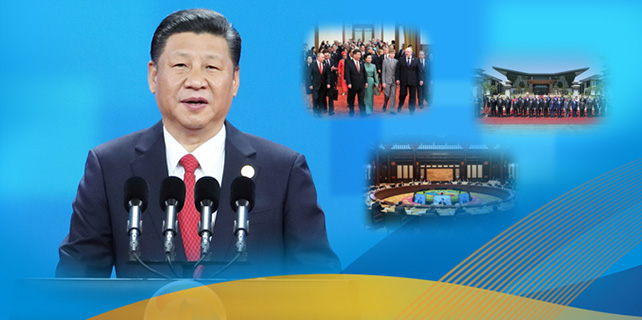Crowded skies

Though the usage of drones is quickly growing in popularity around the world, these unmanned flying objects also represent a growing problem for airspace safety in China where laws and regulations regarding such devices are still being developed.
While China's home-grown C919 passenger jet made its maiden flight to much pomp and fanfare, it wasn't the only aerial vehicle to have grabbed the headlines in recent weeks.
The Civil Aviation Administration of China (CAAC), the country's top aviation regulator, announced on May 16 that it would soon launch a revised drone registration system. All drones weighing above 250 grams must be registered starting June, according to Zhang Ruiqing, deputy head of the Office of Air Traffic Regulation of the CAAC.
Zhang added that the preliminary registration system has been completed and online testing began on May 18.
CAAC also announced protective zones around 155 airports and said it will introduce more technical measures to ensure that civil aviation will not be affected by drones. For example, electronic fences will be erected to keep drones away from the airports.
Shanghai-based Xinmin.cn reported that the regulator is also trying to develop a data-sharing and search system for different drone operation platforms to exchange information.
The announcement came after scores of flights were cancelled in Chengdu of Sichuan province and Chongqing due to unauthorized drone activity near the airports that was deemed a threat to safety.
According to media reports, more than 100 flights were forced to land at alternative airports or return due to the presence of drones in the sky on April 14, 17, 18 and 21, leaving over 10,000 passengers stranded at Chengdu Shuangliu International Airport.
Shenzhen-based DJI Technology Co Ltd, a leader in the drone market, said in a notice: "DJI pays special attention toward the industry and will reward 1 million yuan ($145,000) to whoever offers information that leads to identifying the people carrying out the unauthorized drone flying activity during these four days."
Investigations into the matter are still being carried out by the public security bureau.
Wang Fan, a director from the marketing division of Shenzhen DJI Technology, noted that the incident has created "an extremely negative impact on people's impression of drones" and urged enthusiasts to report their drone activities to the relevant authorities before carrying out their flights.
The latest incident disrupting air travel in Chengdu and Chongqing is not an isolated case. Over the past month, a total of 13 incidents have taken place in Chengdu, Chongqing and Kunming of Yunnan province, according to Shanghai-based eastday.com.
Measures welcomed, more needed
"The new registration system marks the beginning of regulation and is good news for the drone sector," said Li Hongtao, founder of professional drone users network UAV World, which is also the nation's first drone-training platform.
?Captain Zhu, an architect in Shanghai who started flying drones three years ago and hopes to stay anonymous, said the products he purchased from DJI have already been registered with the maker. "I applaud the registration system, but I hope future application procedure won't be too complicated," he said.
Presently, owners of drones that weigh under 7 kilograms do not require a license to fly their devices. However, Zhang Minghua, a drone enthusiast and trainer in Shanghai pointed out that such drones can still pose a threat to the safety of the skies.
"Using a 7-kilogram drone as a benchmark for deciding whether a certificate is needed or not is funny, because that is the average weight of an adult swan, one of the largest flying creatures," he said.
Li said that more could be done, such as assigning a specific administrative department to supervise the emerging drone sector and create unified standards.
"You need a driving license and a car plate before you can drive. Likewise, a certificate and a drone registration system should be mandatory for those wanting to fly a drone. This will ensure that the sector develops in a healthy manner and does not cause safety issues," he said.
Li also suggested that authorities should create an intuitive system that allows drone users to easily apply for flight clearance and receive updates about the locations they should not be flying their drones in.
"Just like how new drivers are not allowed to drive on high-speed roads, amateur drone operators without enough experience and training should not be allowed to fly up to certain heights either," he added.
Ke Yubao, the executive secretary-general of the Aircraft Owners and Pilots Association of China told reporters that the efforts made by regulators should focus on the following: drafting laws and regulations that set aside a portion of airspace for drones, establishing a complete drone-flying application procedure, as well as developing a system that can monitor drone flights in real time.
The drone problem, however, is not limited to China. During a recent aviation safety conference between China and Europe, Patrick Ky, executive director of the European Aviation Safety Agency (EASA), said that countries in Europe are also facing similar challenges.
Due to the lack of laws and regulations in China, there are no standard penalties for drone operators who cause disruption to air traffic.
















